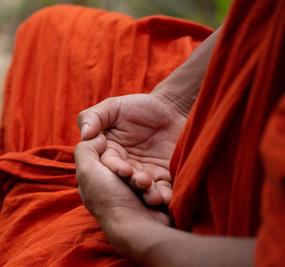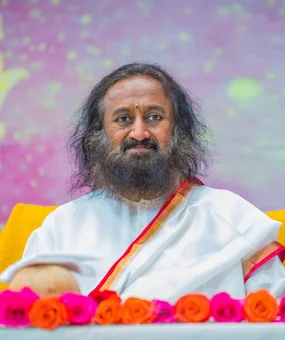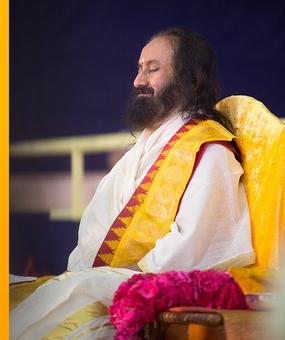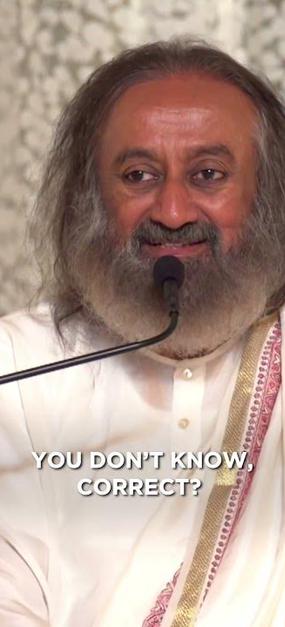Buddha’s Silence: The Power of Unspoken Wisdom
When Buddha got enlightened on the full moon day in May, he kept silent. For a whole week, he did not say a word. Mythology says that all the angels in heaven got frightened and said, “Once in a millennium someone blossoms so fully like Buddha. Now he is silent, is not saying a word!” It is said all the angels approached Buddha and asked him to say something, please speak something.
Buddha said, “Those who know, they know, even without my saying, and those who do not know, will not know by my words. Any description of life to a blind man is of no use. One who has not tasted the ambrosia of existence, of life, no point in talking to them about it. So I am silent,” he said. How can you convey something so intimate, something so personal? Words cannot. And many scriptures in the past have declared, “Words end where truth begins.” The argument was very good.
But the angels said, “Yes, we agree, what you say is right. But, Buddha, considers those who are on the borderline. There are a few who are in between, who are neither fully enlightened nor ignorant. For them, a few words will give a push. For their sake, you speak something, say something. And every word of yours will create that silence. Words are to create silence. If words create more noise, then they have not reached their goal.” And Buddha’s words would definitely create silence, because Buddha is the manifestation of silence.
Silence is the source of life, and is the cure for diseases. You might have noticed when people are angry, they keep silent. Either they shout a lot, and after shouting they become silent. Or when you are sad you say, “Leave me alone.” You keep a long face and keep silent.
You can easily determine whether someone is in the right mind. If they are very silent, then you know something wrong. If you are sad, you go and become silent. People put their heads down and they keep silent. And if you are ashamed, you become silent. And if you are wise, you become silent. And when you are confronted with ignorance and useless questions, you become silent. What can you do?
When Jesus was asked to prove, “Are you the son of God?” he kept silent. That was the wisest thing to do. When you are demanded for proof of something which is beyond proof, the remedy is silence. You are telling someone you have pain in your leg, and they ask you, “Come on, prove it to me, how do I believe you?” How can you prove your pain?
When you cannot prove something as gross as pain, how can you prove something so intimate as enlightenment, as Divinity? Wise become silent. There is an old Sanskrit proverb that says, “Distortion is the root of speech.” The moment you start speaking, you have distorted. Words cannot capture existence, but silence can.
Space and silence are synonymous. Joy and fulfillment bring the silence. Desire brings the noise. Silence is the cure, because in silence you come back to the source, and that creates joy. That’s why when someone is sad, they become silent, and they get rid of their sadness, they come out. They’re supposed to come out with joy or some calmness, at least.
Buddha was the manifestation of silence. His silence had come from saturation, not from lack. Lack creates complaints and noise, saturation brings silence. Look at the noise in your mind. What is it about? More money, more fame, more recognition, fulfillment, relationships – the noise is about something. Silence is about nothing. Do you see what I am saying? Silence is the basis; noise is the surface, is the outer. Noise indicates lack, need, or want.
Buddha’s life was not of lack, need or want. From the very beginning, he lived a very saturated life. Any pleasure would just be at his feet the moment he wanted it. Gautama, Siddhartha lived such a life, and you would wonder how a person of such pleasure and luxury could talk about sorrow! One has to experience sadness, sorrow, and misery in the world in order to speak about it.
But Buddha said the first principle, the first truth he discovered was–there is sorrow. As he was that sensitive, that saturated in the sensual pleasures from outside, there was nothing to go in for, because everything would be there. How would you go in for something that is already there? All the pleasures were there. He was silent from the very beginning because there was saturation. His silence had arisen out of saturation.
But one day he said, “I would like to go and see what the world is.” This inquiry, inquisitiveness arose in him. And when he saw someone who was sick, someone who was old and dying, and someone dead, these three instances or events were good enough to bring in him the knowledge that there is misery.
When he saw someone sick, Buddha said, “Enough, I have experienced it.” Such deep silence, such consolidated silence alone can be that sensitive. To see someone’s pain and reflect it totally and feel it, experience it. Just a glimpse at an old man and a dead body was good enough. Buddha said, “There is no joy in life.” He said, “I am dead already. There is no meaning in life. Come on, let’s go back.” He went back to the palace.
We see so many people dying, we see so much misery, we remain insensitive. Why? Because there is no silence. We are caught up in our own little hankering, cravings, and aversions. The mind is filled with its own noise. It is unable to perceive the music of existence. Silence is the music of this existence. Silence is the secret of this existence.
Just a glimpse of misery was good enough for Buddha to start on a journey of inquiry. What is the purpose of life? Why are we living? What is the universe about? All these questions, the most meaningful questions arose in that silence, in that silence of saturation. Then Buddha set out in quest of truth, all by himself, leaving the palace, his wife and son. The stronger the silence, powerful the questions, too, that arise from such a silence. Nothing could stop him. So he escaped. He knew in the daytime he wouldn’t be able to go. So he quietly escaped from the palace at night, and for many years he searched.
He did all that people told him to do, went from place to place. Someone said, “Do fasting,” he did the fasting. He walked many paths and finally sat and discovered four truths. Dukkha, in the world there is misery. And there is a cause for misery. You cannot be unhappy without any reason. You can be happy with a reason, without any reason, but you cannot be unhappy without a reason.
If you notice, a baby, a child, it cries only when it needs milk, or when it has to go to sleep or it needs something. But when the needs are taken care of, a child is happy, and joyful. A baby will look at its own finger and it’s happy. It’s not even looking at its finger; it’s happy, simply joyful because joy does not need a reason. Laughter does not need a joke, but misery has a cause. Whenever you are unhappy, there is a cause for that unhappiness.
So Buddha said, “The first truth is–there is misery, world is misery.” When this truth becomes solidified in the mind, in our experience, world is misery, then alone you can see what is beyond this world, that something, the spirit, which is all joy.
In life, there are only two possibilities to learn. One is to observe the world around us and know from others’ suffering and others’ futile exercises that this is waste, or on your own experience go through it, and then you’ll find it is misery. There is no third possibility. The more sensitive you are, you don’t need to go through all that by yourself. You can look at those who are going through and become wise.
If that is not possible, never mind, you go through! You will come out of it complete, more wise. This is for sure! Life is immortal. It’s only a matter of learning the lesson sooner or later. There is misery, you cannot deny that. And there is a cause for misery, the second truth.
The third truth, he says, “It is possible to eliminate misery.” If misery is your nature, you cannot eliminate it. And the fourth truth, he said, “There is a way, the path… There is a path to get out of misery.” And the path, he prescribed eight-fold path which included the right practice, the right meditation, the right equanimity, the right kind of silence. It’s not the silence of mourning, it’s not the silence of anger, hatred, the right type of silence, the right type of samadhi, the right vision, the right equanimous vision.
Mind is noise, the source of mind is silence. That’s why Buddha said, “No mind.” That doesn’t mean that Buddha was not talking. How can you talk, how can you interact with people if there is no mind? When Buddha said “No mind,” he meant not that chain of thoughts that simply wander around in your mind all the time. Buddha kept silent for many questions.
An ancient rishi said, “Become answerless”. Every question only pushes the question a little further. Every answer brings forth many more questions. There is no end to the question/answer session. It can go on forever! If you answer one question, it’ll bring forth another ten questions. The question and answers are, are the pair, are the couple? They have no family plan!
He said, “Go beyond the questions, be answerless, for you are, your being has the solution to all the questions”. Turn every question into wonder. Ho! You know, what is the difference between question and wonder? A question creates violence, wonder creates silence. A question is looking for an answer, wonder is another question not looking for an answer. Do you see what I am saying? You wonder, hah!, what about this, I wonder how beautiful this is? The astonishment of wonder does not seek an answer. It brings you home to silence.
And such intelligent, intellectual genius, when they are asked to take a bowl and beg, just imagine, what would be the fate of those people? They became the embodiment of compassion. Observe the sensations, observe the emotions, and observe your true nature. What is the true nature? It is peace, it is compassion, it is love, friendliness and it is joy. And silence gives birth to all this. Silence swallows the sadness, guilt, and misery, and gives birth to joy, compassion, and love.
And that’s exactly what the life of Buddha was. He took… He came to take away the misery, guilt, fear, arrogance, and ignorance, and bring back wisdom, strength, beauty, knowledge, and peace. And it is available for you now, here, everywhere. Everyone can enjoy and cross, hm? the samsara. Do you see what I am saying? That much for today.




















